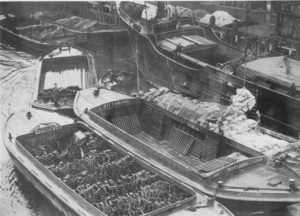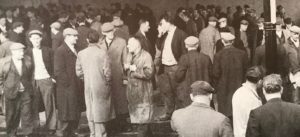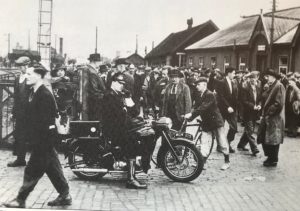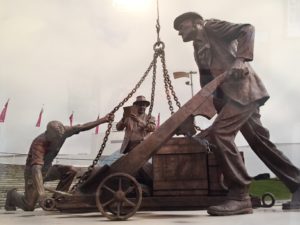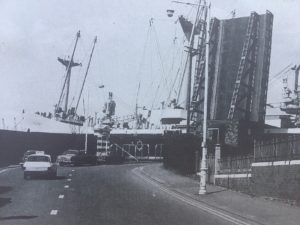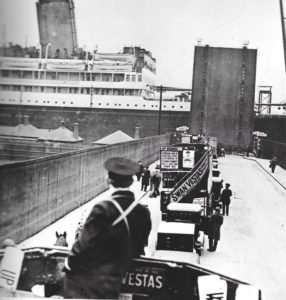My word! Phrases and sayings that are part of our community…
I’ll have to be very careful with this look back at the phrases and sayings that have been part of life in and around the Royal docks community since well before I was a twinkle in my mother’s eye.
If I give the impression I don’t know my ’ariss from my elbow I might have been said to om the verge right greenacre.
Our reflective piece of course has some rhyming slang, as many of the phrases we have used over the last 70 or more years in our streets and homes are down to Cockney life. But the ironies and slang can be a sheer delight and full of self parody.
Much of the language originated in poverty – imagery that summed up poor lives
Many areas are looked on as Cockney, but in truth the old county borough of West Ham, and the sub districts of Canning Town, Custom House, Silvertown and North Woolwich have probably the best claim. They represent the pushing out of the East End by industrialists who escaped legislation and restrictions by crossing the River Lea.
The phrases and sayings we have used – and still use – make our language so rich.
If brings humour into play and keeps the conversation flowing – something we are really good at in our manor. Jokes can be the life blood of our existence.
Robert Barltrop, a great columnist for the Newham Recorder in the 80s, 90s and early 2000s told me a joke that he described as a ‘Cockney life story in two sentences
A girl is alone with her grandfather and tells him: “Grandad, I’m in the family way.” He replies: “Wait till you are my age darling – you’ll be in everybody’s way.”
It was pure joy getting people to relate the sayings that have helped keep them alive.
My nan Judith Myers used a phrase that has always stick with me to describe déjà vu or Groundhog day, perhaps with a slight twist: “It’s the same meat, different gravy,” was her favourite at her North Woolwich home.
My aunt Annie Sharpley was quite impatient with someone who could not make up their mind or who was dithering. “He doesn’t know if he wants a sh*t or a haircut,” was a phrase she used well into her 80s.
In the Royal Docks community many of the words and phrases we use stem from the dockers. They had a language of their own which quickly penetrated into all local lives.
‘Perm’ was short for permanent as against a casual employee.
My favourite was ‘greenace’, which my father Bill Grainger assures me means goods falling out of a sling during the loading of ships. “There’s been a greenacre, was heard after an accident. “ And so it also became used as a warning cry like ‘look out.’
- Workers try not to have a greenacre while they load up
Dockers used to stand on the cobbles in the street outside the Connaught Pub in Custom House for decades waiting outside the dock gates to see if they were chosen for casual work that day, and to get their work ticket. This became known as waiting ‘On The Cobbles.’ It was also known as being ‘On The Stone’ or ‘ On the Stones.’
- Waiting for work ‘On the Cobbles’ or ‘On The Stone’
Former docker John Ringwood is one of the figures in the bronze statue commemorating dock workers outside the ExCeL centre in Custom House.
- The Dockers’ statue outside the ExCeL centre
He said: ”There were also phrases for the tools we used. The work could be exhausting and there were two hammers, one weighing 12lb (a weight just under that of the maximum ball used in ten-pin bowling nowadays), the most used one, and another a 24lb much heavier hammer for the big jobs when something really needed shifting,” said John.
That became universally known as ‘The Monday Hammer,” he reported.
Knowing I was heading for a laugh I asked why.
“ ’Cos it was so blooming heavy that by the time you got to Tuesday it was too heavy to lift!”
My uncle Tommy Kaye told me as a child that if a screwdriver wouldn’t do the job to get a screw into a wall, you should reach for a special tool to complete the job…’the American screwdriver’ he called it. He went to get it from his overflowing toolbox. It was a hammer!
Charity boss Kevin Jenkins said that another dock phrase was ‘billo’ – as in ‘look out below’ – shouted as a warning when something fell from height.
Mavis Smith gave an illustration of what it was like for her father standing, waiting for work. “I remember my Dad talking about his docks life, as he had to virtually fight to get a work ticket from the man standing on a box giving them all out in the morning. The noise the men made carried across to Claremont Close where we lived.”
Of course, there are some hyper-local phrases, and one that passed through many generations in the Silvertown and North Woolwich communities and beyond the others in the Royal Docks and Newham was ‘catching a Bridger.’
When the big up and down bridge near Harland and Wolfe was up and the swingbridge near the Connaught was turned round, we were all effectively trapped in our “island” community, unable to get out. Traffic stood still and it could be incredibly frustrating. The bridges were raised to let ships in or out of the docks.
- Catching a ‘bridger’ in North Woolwich
“It was something everyone got used to,” said Bill, “part of local life.”
Stephen Clements reminded me that as children the word ‘weeny’ was used for the smallest one in a group of kids. He (or she) was made to keep ‘look out’ is a group of youngsters were getting up to mischief.
Only last month, at a funeral of a local legend, general conversation turned to the use of the phrase ‘wide boy’ as younger members of the group asked what it meant.
After over 100 years use in markets and fairs that phrase became adopted as a common term in the 1940s to describe someone who was a bit of a swindler, or knowing and ‘had got his wits about him.’
Many in our communities are thought a bit common because of their accents – but though we are often criticised for dropping our h’s, so do the French, said Bill Harris.
“But we were and are neither more or less literate than the rest.”
In my experience Cockneys have a strong code of politeness and respectability.
The basic words we were taught as children were ‘lady’ and ‘gentleman.’
These sayings and phrases mean so much to so many of us – and keep our lives grounded in reality. But it’s the general good humour and laughter and smiles they create that shines thorough,
Willie Myers, 75, raises a laugh among his friends when he is off to the loo and says: “I’m going to strain the cabbage.”
Similarly, Ted Bassett gets a similar reaction when he says: “I’m going to shake hands with my best friend.” Toilet humour has survived completely and remains a favourite. Aunt Annie Sharpley had another phrase: “Wherever you may be, let your wind go free.” ‘Jimmy Riddle’, ‘Having a slash’ and ‘having a leak’ are all in frequent use.
Jean Whitelock said her mum’s favourite warning to her children was: “If you fall off and break your leg don’t come running to me.”
When someone in his family had bad luck or didn’t quite get the result they wanted, John Williams used to tell them: “You thought you had a motorbike, but only got the handle.”
Someone who had done something wrong was always said to ‘have made a right ricket,’ said Bill Stevens, 86. “If you were a bit slow or dim, you might also have been said to be as thick as two short planks.”
Lesley Quirk recalled one of her dad’s favourite phrases for a woman who perhaps was pretending to be something she really wasn’t was : “She’s all fur coat and no knickers.”
Those in our communities always have been unable to forgive meanness.
Tight and stingy are words we use to describe this trait.
But Alan Jones sums it up for me: “Tighter than a gnat’s a*se” is his way of putting it.”
My grandad Fred Myers went slightly further when, as he used to say: “He wouldn’t give you the drippings off his nose.”
There are however, a few words of praise for those who seem to be able to prosper without much effort.
- Our Royal Docks
Over drinks at the Fox at the Connaught last week, Barry Joyce reminded me of the phrase: “If he fell down the bog, he’d come up with a gold watch!”
Mealtime is another source for phrases of excellence, as well as greediness..
In our part of East London, if you overeat, you are known as ‘greedy guts’ or a ‘greedy pig’ or ‘a right gannet.’
We also eat dinner in the middle of the day. Lunch is a snack taken to work for the middle of the morning. The final part of dinner is ‘afters’ and the main course is ‘befores.’
Two World Wars gave a bit of a melting pot to our language. Our communities and Cockney in general acquired a few catchphrases in this way.
From the First World War: ‘Parley-Vous’ was one. Having a chat, it then became ‘parlayvoo’ or ‘having a parly’ meant talking or ‘having a conflab.’
‘San Fairy Ann’ is also still used – for it doesn’t matter.
And words came from Romany Gipsies. ‘Mush’ is used in the same way as mate..my good friend.
It can also be used as face, as in : “He took one right in the mush,” which is believed to have come from ‘mouche’ the bull’s eye of a target.
The Romany’s also brought us the word Chavvy for child. Nowadays the meaning is a tad more derogatory!
One of the classic phrases for being lonely or on your own is: ‘On Your Jack’ , short for Jack Jones. This rhyming slang is probably the Jack Jones who was an East London MP in the 1920s.
Given the Royal Wedding was just a few months ago, it’s a good idea to remember that our area has a reputation for patriotism, stemming from the damage it suffered during the Blitz. The virtue of Cockneys like us was to show a brave face and good humour. ‘London Can Take It’ was chalked and painted on walls during the war. You could not say the same for places like Hampstead.
To many from our neck of the woods, an anti-royalist is someone who wants to take away the chance of a good old knees-up . The monarchy are good at that.
Visits by the monarchy are lapped up and we believe they can all take a joke.
The Abdication period in 1937 was said to be the start of this.
The senior citizens of today still remember the playground phrases of their youth.
One in particular, told by Bill Stephenson is as fresh as a daisy and referred to even now: “Why are Mrs Simpson’s drawers like the flag at Buckingham Palace? Because they go up and down at the King’s Command.”
And talking of celebrations, drink remains a pleasure today, a beverage and the foundation of much of our social life.
But though we like it so much our phrases for it are mostly contemptuous.
‘Drink; ‘drunk’ ‘a quick one’. Booze is the universal noun and verb!
The pub is the boozer. We refer to getting ‘p*ssed as a newt’ or ‘half-cut’ or ‘blind drunk.’ Gin is still known as ‘mother’s ruin’
If you are confused it’s ‘the beer-talking’. The end of hours is still ‘ chucking out time’ which has also become common usage for other venues. “When is chucking out time at the library or shop.”
Our rich language in our manor in the last 70-80 years gives us phrases for every occasion. For a disappointment or failure, or anti-climax there’s the popular: “Well that was after the Lord Mayor’s Show,” which speaks for itself.
Explaining how things work or have happened, said Peter Perry; is usually topped off with phrases like: “Now you know how many beans make five.”
Tom Quirk often used the phrases: “That’s how milk got in the coconut,” and “It’s as true as I’m standing here.”
Money (and lack of it) is also a ripe source for phrases that have stood the test of time…it’s serious stuff after all.
Judith Myers used a phrase we still try to live by. “Out of debt, out of danger.”
Prices are compared with sayings like: “How much did they rush you for that?”
The phrase “couple of bob” is anything but when asking for a loan. It applies to any amount!
Dirtiness is generally frowned on. ‘Cleanliness is next to Godliness’ can often be accompanied by ‘You could eat your dinner off the floor in her place.’
But generally, we are uninhibited.
Home and family are most important – in real life. It’s one of the few things that is true in EastEnders! It’s at the centre of our livres.
The area outside our front doors is still known to everyone as the ‘doorstep, ’ even though you may live in a block of flats. Hospitality is vital. It means a cup of tea or coffee. A welcome caller is still greeted with the phrase: ‘If I’d known you were coming I’d have put the kettle on or baked a cake.’
Visitors love to say: ‘I’m gasping or gagging for a cuppa.’
A guest often uses the phrase: “I’ll have to love and leave you,” as they get ready to go.
Manners remain important. “I can’t take you anywhere,” is often said mockingly to someone who may have crossed a little line, normally with humour.
‘Where were you brought up?’ or ‘Would you do that at home’ may also follow.
The last words – as usual – should go to the women.
They have their own collection of comments on men.
‘I wouldn’t be seen dead with him’ or ‘I’ve seen better things crawl out of cheese.’ They might even weigh in ‘he fancies himself, don’t he?
And there’s a song that many women in our manor remind us of.
It came about as a rejection of amorous advances made by men.
‘Give it to the girl next door.’ (repeat).
‘I don’t want it,
I’ve told you so before.
Take it away, take it away,
Give it to the girl next door.’
- Life in the docks
Pictures: Colin Grainger collection/ Newham Archives and Local Studies/ Port of London authority/Andrew Baker
This is a longer version of one of the many articles in the online archive created by londonsroyaldocks.com in their #ForgottenStories series.
More at https://www.londonsroyaldocks.com/forgotten-stories/


